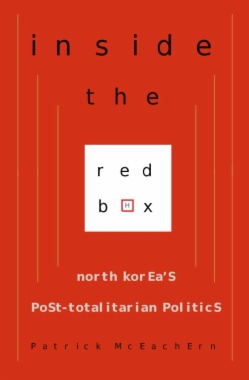North Korea's institutional politics defy traditional political models, making the country's actions seem surprising or confusing when, in fact, they often conform to the regime's own logic. Drawing on recent materials, such as North Korean speeches, commentaries, and articles, Patrick McEachern, a specialist on North Korean affairs, reveals how the state's political institutions debate policy and inform and execute strategic-level decisions.
Many scholars dismiss Kim Jong-Il's regime as a "one-man dictatorship," calling him the "last totalitarian leader," but McEachern identifies three major institutions that help maintain regime continuity: the cabinet, the military, and the party. These groups hold different institutional policy platforms and debate high-level policy options both before and after Kim and his senior leadership make their final call.
This method of rule may challenge expectations, but North Korea does not follow a classically totalitarian, personalistic, or corporatist model. Rather than being monolithic, McEachern argues, the regime, emerging from the crises of the 1990s, rules differently today than it did under Kim's father, Kim Il Sung. The son is less powerful and pits institutions against one another in a strategy of divide and rule. His leadership is fundamentally different: it is "post-totalitarian." Authority may be centralized, but power remains diffuse. McEachern maps this process in great detail, supplying vital perspective on North Korea's reactive policy choices, which continue to bewilder the West.
- Contents
- Figures and Tables
- Acknowledgments
- CHAPTER ONE: Introduction
- Views of the Regime
- Diverse Institutional Views
- Toward a New Model
- The Stakes
- Road Map
- CHAPTER TWO: Post-totalitarian Institutionalism
- Existing Models of North Korean Politics
- The Emergence of Post-totalitarian Institutionalism
- Post-totalitarian Politics
- Research Design
- CHAPTER THREE: Historical Context
- Foundations of the Founding
- Kim Il Sung and Totalitarianism, 1956–1990
- The Transition Period, 1991–1998
- Post-totalitarian Institutionalism, 1998–Present
- CHAPTER FOUR: North Korea’s Political Institutions
- The Korean Workers’ Party
- The Korean People’s Army
- The Cabinet
- The Security Apparatus
- Supreme People’s Assembly
- Subnational Governments and the Judiciary
- CHAPTER FIVE: Institutional Jostling for Agenda Control,1998–2001
- Taepodong-1 Launch
- The Kumchang-ri Suspected Nuclear Facility
- OPlan 5027
- The Second Chollima March
- Uncoordinated Institutions
- Missile Negotiations and the Inter-Korean Summit
- CHAPTER SIX: Segmenting Policy and Issue Linkages, 2001–2006
- Toward Economic Reform
- Issue Linkages: Inter-Korean and U.S. Policy
- Pyongyang Reacts to New U.S. Policy
- Regime Change Short List Concern Closes Ranks
- Linking and Delinking Issue Areas
- End of the Agreed Framework and the Second Nuclear Crisis
- Inter-Korean Relations: A Separate Track?
- Nuclear Declarations
- Diplomatic Impasse, Mutual Pressure
- “The Atmosphere Has Improved” —for a Day
- LWR Demands and Banco Delta Asia
- Cross-Border Cooperation: The Only Game in Town
- Bureaucratic Cracks on “Sanctions” and Missile Tests
- Hitting Rock Bottom: The Nuclear Test
- CHAPTER SEVEN: Policy Reversals, 2006–2008
- Return to Six-Party Talks
- Cabinet Economic Reformer Replaced with Economic Reformer
- Chris Hill in Pyongyang
- Presidential Turnover in South Korea
- Refocusing on the United States
- Continuity Amid Change: The North Korean Economy
- CHAPTER EIGHT: Conclusion
- North Korea’s Post-totalitarian Institutionalism
- An Evolved Polity
- Decision Making
- Importance of the Internal Mechanism
- North Korea, Comparative Politics, and Downstream Consequences
- North Korea’s Future
- Notes
- Bibliography
- Index

